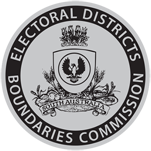The Electoral Districts Boundaries Commission (EDBC) invites representations in relation to the proposed electoral redistribution. Hearings, at the discretion of the EDBC, allow individuals or groups to make personal representations in support of a written submission.
Following the receipt of evidence and submissions in support of representations, the EDBC prepares and publishes a draft order for the electoral redistribution. Final submissions are then invited from any interested member of the public. Evidence or argument relating to such submissions may be the subject of consideration at further hearings.
The EDBC then proceeds to finalise its order which is published in the Gazette.
If there are no appeals against the order, the order becomes operative three months after the order is published. Where an appeal has been made, the order becomes operative three months after the day on which all appeals were finally determined.
However, the order only becomes effective on the day on which a general election of members of the House of Assembly is next held.
Following the 1983 redistribution, the EDBC ‘avoided the use of geographical names since they are hardly ever accurate as a description of a district’ and gave ‘electorates the names of former distinguished citizens of South Australia’.
However, in 1998, the EDBC took note of a House of Assembly resolution that it consider ‘naming State districts after city, town or district names and deceased persons’.
The EDBC has no authority to determine the number of electoral districts or parliamentary members or the voting and counting systems used for the election of the members.
Any draft report produced by the EDBC is subject to public appraisal and, although Parliament is not able to change a decision taken by the EDBC, an elector may appeal against the validity of its final determination.

